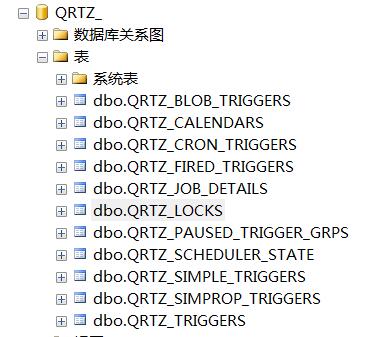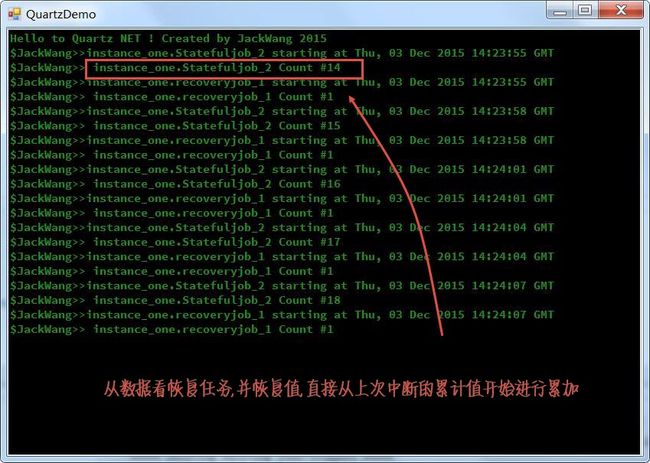Quartz.NET开源作业调度框架系列(五):AdoJobStore保存job到数据库
Quartz.NET 任务调度的核心元素是 scheduler, trigger 和 job,其中 trigger(用于定义调度时间的元素,即按照什么时间规则去执行任务) 和 job 是任务调度的元数据,scheduler 是实际执行调度的控制器。在Quartz.NET中主要有两种类型的 job:无状态的(stateless)和有状态的(stateful)。对于同一个 trigger 来说,有状态的 job 不能被并行执行,只有上一次触发的任务被执行完之后,才能触发下一次执行。无状态任务一般指可以并发的任务,即任务之间是独立的,不会互相干扰。一个 job 可以被多个 trigger 关联,但是一个 trigger 只能关联一个 job。某些任务需要对数据库中的数据进行增删改处理 , 这些任务不能并发执行,就需要用到无状态的任务 , 否则会造成数据混乱。
另外有些情况下,我们需要将任务保存到数据库中,特别是有些任务中包含参数,例如累加的任务,如果可以保存到数据库中,即便中间断电或者程序异常重启,中间计算的结果也不会丢失,可以从断点的结果进行运算(首先恢复任务),下面介绍一下如何用AdoJobStore将任务保存到SQL Server数据库中.
事先要在数据库上新建一个QRTZ_数据库,并执行SQL建表脚本:
1 RecoveryJob
是一个无状态的任务,代码如下:
1 using System; 2 using System.Collections.Specialized; 3 using System.Threading; 4 using Common.Logging; 5 using Quartz; 6 using Quartz.Impl; 7 using Quartz.Job; 8 using System.Windows.Forms; 9 namespace QuartzDemo 10 { 11 /// <summary>
12 /// 无状态的可恢复的任务 13 /// </summary>
14 public class RecoveryJob : IJob 15 { 16
17 private const string Count = "count"; 18 public virtual void Execute(IJobExecutionContext context) 19 { 20
21 JobKey jobKey = context.JobDetail.Key; 22 if (isOpen("FrmConsole")) 23 { 24 try
25 { 26 //获取当前Form1实例
27 __instance = (FrmConsole)Application.OpenForms["FrmConsole"]; 28 // 如果任务是恢复的任务的话
29 if (context.Recovering) 30 { 31 __instance.SetInfo(string.Format("{0} RECOVERING at {1}", jobKey, DateTime.Now.ToString("r"))); 32 } 33 else
34 { 35 __instance.SetInfo(string.Format("{0} starting at {1}", jobKey, DateTime.Now.ToString("r"))); 36 } 37
38 JobDataMap data = context.JobDetail.JobDataMap; 39 int count; 40 if (data.ContainsKey(Count)) 41 { 42 //是否能从数据库中恢复,如果保存Job等信息的话,程序运行突然终端(可用调试时中断运行,而不是关闭窗体来模拟)
43 count = data.GetInt(Count); 44 } 45 else
46 { 47 count = 0; 48 } 49 count++; 50 data.Put(Count, count); 51
52 __instance.SetInfo(string.Format(" {0} Count #{1}", jobKey, count)); 53 } 54 catch (Exception ex) 55 { 56 Console.WriteLine(ex.Message); 57 } 58 } 59 } 60
61
62 private static FrmConsole __instance = null; 63
64 /// <summary>
65 /// 判断窗体是否打开 66 /// </summary>
67 /// <param name="appName"></param>
68 /// <returns></returns>
69 private bool isOpen(string appName) 70 { 71 FormCollection collection = Application.OpenForms; 72 foreach (Form form in collection) 73 { 74 if (form.Name == appName) 75 { 76 return true; 77 } 78 } 79 return false; 80 } 81
82 } 83 }
2 RecoveryStatefulJob
是一个有状态的任务,和无状态的区别就是在任务类的上面用[PersistJobDataAfterExecution]标注任务是有状态的 , 有状态的任务不允许并发执行,也需要标注 [DisallowConcurrentExecution],代码如下:
1 using System; 2 using System.Collections.Specialized; 3 using System.Threading; 4 using Common.Logging; 5 using Quartz; 6 using Quartz.Impl; 7 using Quartz.Job; 8 using System.Windows.Forms; 9 namespace QuartzDemo 10 { 11 /// <summary>
12 /// 用这个[PersistJobDataAfterExecution]标注任务是有状态的, 13 /// 有状态的任务不允许并发执行 [DisallowConcurrentExecution] 14 /// </summary>
15 [PersistJobDataAfterExecution] 16 [DisallowConcurrentExecution] 17 public class RecoveryStatefulJob : RecoveryJob 18 { 19
20 } 21 }
3 AdoJobStoreExample
用 properties["quartz.dataSource.default.connectionString"] = "Server=(local);Database=QRTZ_;Trusted_Connection=True;";定义了数据库的连接信息,程序运行时会自动将任务保存到数据库中:
1 using System; 2 using System.Collections.Specialized; 3 using System.Threading; 4 using Common.Logging; 5 using Quartz; 6 using Quartz.Impl; 7 using Quartz.Job; 8 using System.Windows.Forms; 9 namespace QuartzDemo 10 { 11 /// <summary>
12 /// AdoJobStore的用法示例 13 /// </summary>
14 public class AdoJobStoreExample 15 { 16 public virtual void Run(bool inClearJobs, bool inScheduleJobs) 17 { 18 NameValueCollection properties = new NameValueCollection(); 19
20 properties["quartz.scheduler.instanceName"] = "TestScheduler"; 21 properties["quartz.scheduler.instanceId"] = "instance_one"; 22 properties["quartz.threadPool.type"] = "Quartz.Simpl.SimpleThreadPool, Quartz"; 23 properties["quartz.threadPool.threadCount"] = "5"; 24 properties["quartz.threadPool.threadPriority"] = "Normal"; 25 properties["quartz.jobStore.misfireThreshold"] = "60000"; 26 properties["quartz.jobStore.type"] = "Quartz.Impl.AdoJobStore.JobStoreTX, Quartz"; 27 properties["quartz.jobStore.useProperties"] = "false"; 28 properties["quartz.jobStore.dataSource"] = "default"; 29 properties["quartz.jobStore.tablePrefix"] = "QRTZ_"; 30 properties["quartz.jobStore.clustered"] = "true"; 31 // SQLite 32 // properties["quartz.jobStore.lockHandler.type"] = "Quartz.Impl.AdoJobStore.UpdateLockRowSemaphore, Quartz";
33 properties["quartz.jobStore.driverDelegateType"] = "Quartz.Impl.AdoJobStore.SqlServerDelegate, Quartz"; 34 // 数据库连接字符串
35 properties["quartz.dataSource.default.connectionString"] = "Server=(local);Database=QRTZ_;Trusted_Connection=True;"; 36 properties["quartz.dataSource.default.provider"] = "SqlServer-20"; 37
38 // First we must get a reference to a scheduler
39 ISchedulerFactory sf = new StdSchedulerFactory(properties); 40 IScheduler sched = sf.GetScheduler(); 41
42 bool b是否恢复 = false; 43 if (inClearJobs) 44 { 45 Console.WriteLine("***** Deleting existing jobs/triggers *****"); 46 // sched.Clear();
47 } 48
49
50 if (inScheduleJobs) 51 { 52
53 string schedId = sched.SchedulerInstanceId; 54
55 int count = 1; 56
57 //定义一个无状态的任务
58 IJobDetail job = JobBuilder.Create<RecoveryJob>() 59 .WithIdentity("recoveryjob_" + count, schedId) 60 .RequestRecovery() //recovery
61 .Build(); 62
63
64 ISimpleTrigger trigger = (ISimpleTrigger)TriggerBuilder.Create() 65 .WithIdentity("triger_" + count, schedId) 66 .StartAt(DateBuilder.FutureDate(1, IntervalUnit.Second)) 67 .WithSimpleSchedule(x => x.WithRepeatCount(20).WithInterval(TimeSpan.FromSeconds(3))) 68 .Build(); 69 //可用此来查看定义的触发器触发规则 70 //log.InfoFormat("{0} will run at: {1} and repeat: {2} times, every {3} seconds", 71 //job.Key, trigger.GetNextFireTimeUtc(), 72 //trigger.RepeatCount, 73 //trigger.RepeatInterval.TotalSeconds);
74 try
75 { 76 //如果数据库已经存在同名job和trigger,则绑定失败
77 sched.ScheduleJob(job, trigger); 78 } 79 catch
80 { 81 b是否恢复 = true; 82 } 83 count++; 84
85 //定义一个有状态的任务***********************************************************
86 job = JobBuilder.Create<RecoveryStatefulJob>() 87 .WithIdentity("Statefuljob_" + count, schedId) 88 .RequestRecovery() // recovery
89 .Build(); 90
91 trigger = (ISimpleTrigger)TriggerBuilder.Create() 92 .WithIdentity("triger_" + count, schedId) 93 .StartAt(DateBuilder.FutureDate(1, IntervalUnit.Second)) 94 .WithSimpleSchedule(x => x.WithRepeatCount(20).WithInterval(TimeSpan.FromSeconds(3))) 95 .Build(); 96
97 try
98 { 99 sched.ScheduleJob(job, trigger); 100 } 101 catch
102 { 103 b是否恢复 = true; 104 } 105
106
107
108 } 109
110 //启动
111 sched.Start(); 112 //sched.Shutdown();
113
114 } 115
116 public string Name 117 { 118 get { return GetType().Name; } 119 } 120
121 public void Run() 122 { 123 bool clearJobs = true; 124 //clearJobs = false;
125 bool scheduleJobs = true; 126 AdoJobStoreExample example = new AdoJobStoreExample(); 127 example.Run(clearJobs, scheduleJobs); 128 } 129 } 130 }
可以看到有状态的计数每次累加1,而无状态的每次执行时都会丢失累加数(新的实例),中断程序,查看数据库的QRTZ_JOB_DETAILS表,可以看见还有一个持久化的任务:
中断程序后(调试状态时不关闭窗体,而是中断调试,模拟异常关闭) ,再重新运行可以看到如下界面:



